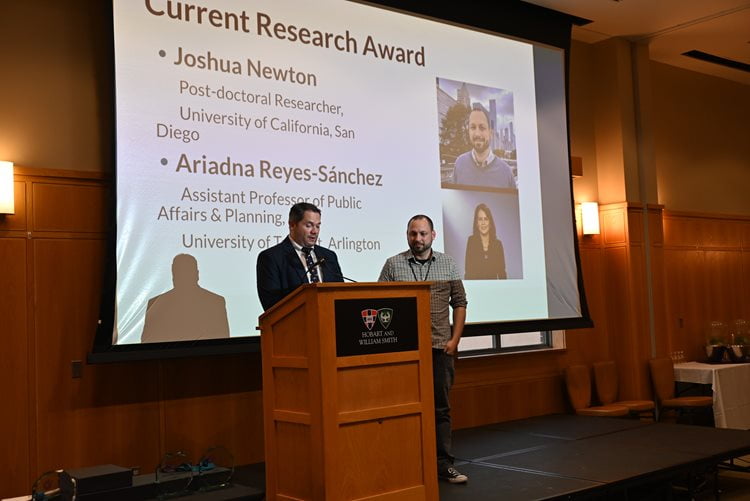Award-Winning Research Puts Sand Branch Residents at the Center of Change

Dr. Ariadna Reyes-Sanchez, an Assistant Professor of Public Affairs and Planning, and UPPP alumnus Josh Newton have been awarded the Community Development Society's Current Research Award for their innovative, resident-driven work in the historically underserved Sand Branch, Texas community.
Their research—rooted in critical theory, insurgent planning, and participatory methods—seeks to challenge conventional approaches to urban planning by putting power in the hands of residents. Over the past four years, Dr. Reyes-Sanchez and Newton have worked side-by-side to bring attention to energy injustice, housing informality, transportation burdens, and issues of environmental justice governance in Sand Branch.
"From the beginning, our goal in Sand Branch was to challenge conventional forms of urban planning by developing good community development practice," said Dr. Reyes-Sanchez and Newton. "Our underlying goals since the beginning of the research have supported that."
 Inspired by scholar Faranak Miraftab's concept of insurgent planning—which calls for practices that are "counter-hegemonic transgressive, and imaginative"—the team's work goes beyond traditional community-based research. Their efforts have evolved from studying housing informality to tackling concerns such as polluted water, illegal dumping, energy injustices, and transportation barriers. "We take this to mean that good community development practice should push back against oppressive systems of power and accepted planning processes for the good of marginalized residents," Newton explained.
Inspired by scholar Faranak Miraftab's concept of insurgent planning—which calls for practices that are "counter-hegemonic transgressive, and imaginative"—the team's work goes beyond traditional community-based research. Their efforts have evolved from studying housing informality to tackling concerns such as polluted water, illegal dumping, energy injustices, and transportation barriers. "We take this to mean that good community development practice should push back against oppressive systems of power and accepted planning processes for the good of marginalized residents," Newton explained.
Through participatory methods like oral histories, photovoice, and collaborative data collection for air and water quality, the team has helped residents reclaim narrative power and bring visibility to their living conditions, such as water and air pollution issues. Their work also draws from solutions in the Global South—areas that have long dealt with informal settlements and resource scarcity.
Drawing on theories, literature, and community-based solutions, their work expands on Reyes-Sanchez's earlier research in informal housing settlements in Mexico City and the Dominican Republic. Their aim is twofold: to better understand how housing informality manifests uniquely within the U.S. and to disrupt the notion that innovation in planning is exclusive to the Global North. "Scholars and practitioners in the Global South have been implementing participatory and creative solutions in informal settlements for decades," Dr. Reyes-Sanchez noted. "We aim to make that work more visible to U.S. planners and policy makers to benefit marginalized communities."
Their work has not been without challenges. One of the most persistent issues has been building and maintaining trust within a community long neglected by institutions. "Through observational and survey research, we slowly built relationships that snowballed into introductions to other community members, invitations to community meetings and celebrations, and partnerships with emergent community leaders," said Josh.
The pair also confronted systemic obstacles, including regulatory barriers enforced by Dallas County that disproportionately impacted residents without providing basic services. "Many residents were displaced from the neighborhood, and current residents are forced to create solutions on their own," they noted. "Our role has been to bring academic resources and knowledge to improve or supplement solutions that residents have already developed to survive."
One of their proudest achievements has been co-creating a neighborhood planning committee—a first step toward establishing formal resident-led governance in Sand Branch. The team hopes to see the committee grow into a 501(c)(3) nonprofit that can access funding and formally advocate for the community's future.
The Community Development Society's Current Research Award affirms the impact of their work and reinforces the importance of participatory, resident-driven approaches to community development.
"This recognition is much appreciated," said Newton. "It encourages us to keep pushing for more and demonstrates the importance of insurgent and participatory strategies in community development."
Looking ahead, Dr. Reyes-Sanchez and Newton are expanding their research efforts. They are collaborating with residents to collect environmental data to support future interventions, and Ariadna is working with other Ph.D. students on similar projects in Liberty County and El Paso, Texas.
Their work exemplifies how thoughtful, engaged scholarship can support systemic change—grounded not in abstract policy but in the lived experiences and visions of the communities themselves.